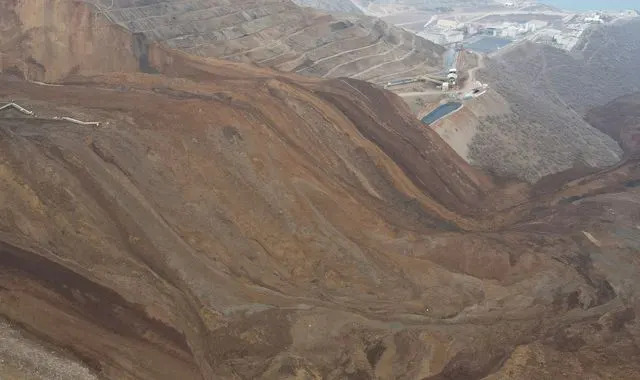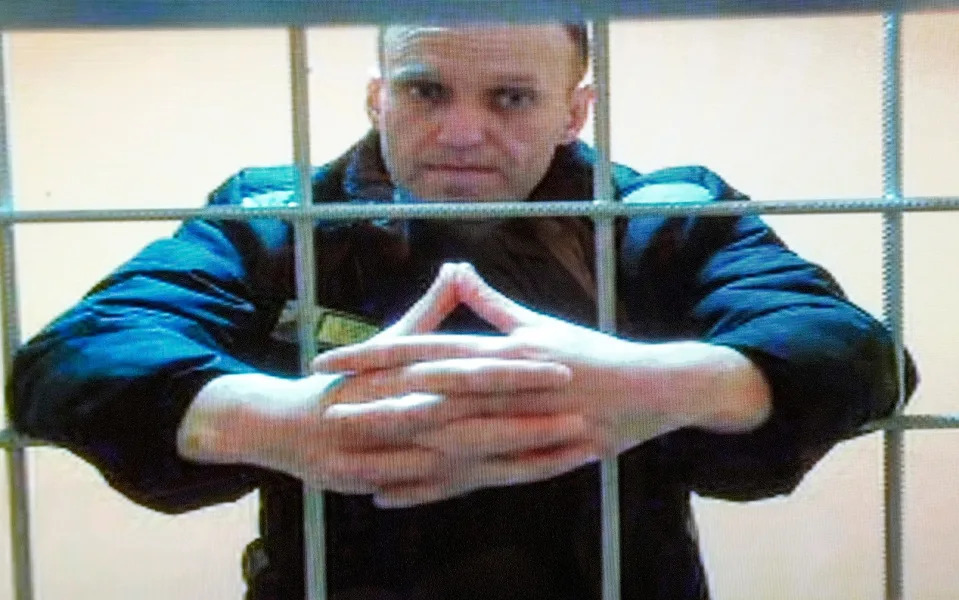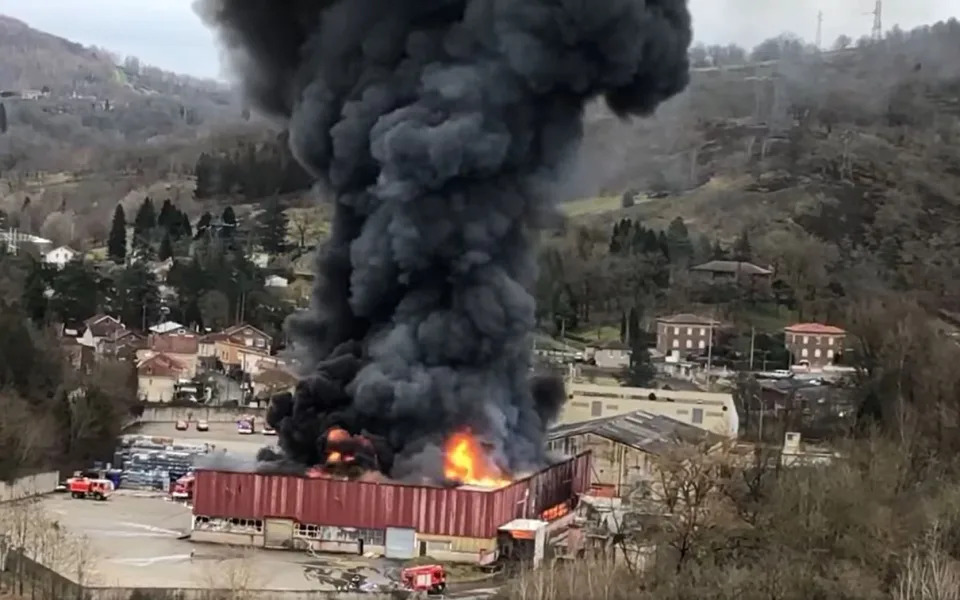FINALLYEnd Gaza fighting now, says Keir Starmer
Daniel Sanderson
Sun, 18 February 2024
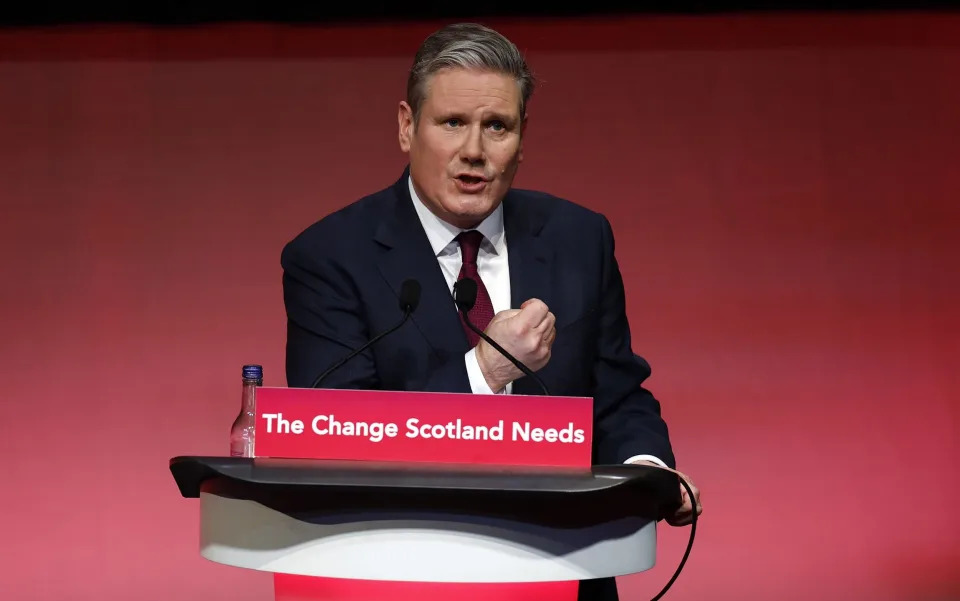
Sir Keir Starmer gives his speech at the Scottish Labour Party annual conference on Sunday - Getty/Jeff J Mitchell
Sir Keir Starmer has called for an end to the fighting in Gaza “now” in an apparent change in stance on calls for an immediate ceasefire.
The Labour leader, addressing the Scottish Labour conference in Glasgow, added that an offensive that Israel is said to be planning in Rafah “cannot happen” and that the area “cannot become a new theatre of war”.
While he added that a ceasefire could not be “one-sided”, he repeatedly stressed on Sunday that he wanted to see an end to hostilities immediately.
He declared: “The fighting must stop now”.
Previously, Sir Keir has refused to back demands for an immediate ceasefire. He has instead stated support for a “sustainable” halt to fighting which would not mean Israel would be expected to unilaterally down arms.

Palestinians search for bodies among the rubble of a destroyed house following an Israeli air strike - Shutterstock/Mohammed Saber
A source close to the Labour leader denied there had been a change of position but Sir Keir has come under increasing pressure from some of his own MPs and Muslim voters to take a harder stance against Israel’s actions.
Labour MPs have come under fire from constituents over the party’s stance on Gaza and many are facing challenges from pro-Palestine candidates at the next election.
The apparent shift also comes ahead of a House of Commons vote this week which threatens to reopen divisions over the issue.
Anas Sarwar, the Scottish Labour leader, has openly demanded an immediate ceasefire, in a call which was backed by Scottish Labour delegates.
Yesterday the leader of a Muslim youth organisation said the Rochdale by-election later this month was a “referendum on Gaza”.
While Sir Keir told the conference that he wanted to see the return of hostages taken by Hamas on Oct 7, he added that he also wanted “an end to the killing of innocent Palestinians” and “an end to the fighting”.
He added: “Not just now, not just a pause. But permanently. A ceasefire that lasts. Conference, that is what must happen now. The fighting must stop now.
“Any ceasefire cannot be one-sided. It must stop all acts of violence, on both sides, and it must lead to a genuine peace process.
“Because the offensive threatened in Rafah – a place where 1.5 million people are now cramped together in unimaginable conditions with nowhere else for them to go – this cannot become a new theatre of war. That offensive cannot happen.”

A Palestinian woman cooks on a wood fire on the street in front of makeshift tents in Rafah - Getty/Abed Zagout
A Labour source said Sir Keir had been using similar language for some time.
The SNP has tabled a motion calling for an immediate ceasefire in Gaza which is expected to be voted on in the Commons on Wednesday.
On Sunday, Mr Sarwar claimed that Labour was in talks with the SNP over their ceasefire motion.
A similar vote in November saw eight shadow ministers break ranks to back an immediate ceasefire, with some 56 Labour members defying a three-line whip and backing an SNP amendment to the King’s Speech.
David Lammy, the shadow foreign secretary, has declined to say how Labour MPs might vote.
“I haven’t seen the motion, it’s not yet put down, we will scrutinise that motion as is our way in Parliament and we will take it from there,” he told the BBC.
“But let us be clear, yes, we will have a vote in Parliament this week but it’s not that vote that will bring about a ceasefire, it’s the diplomatic action.”

Israeli soldiers sit on a tank near the border with Gaza - Getty/Amir Levy
He also sought to play down the idea that the party was divided on the issue.
“I fully understand that Scottish colleagues want the fighting to stop now, we’ve been saying that for weeks, so we agree with them.
“You can have a ceasefire that lasts for a few days. We want the ceasefire to last and to be permanent and to move towards the diplomatic solution. It will only be a political solution that brings an end to this.”
In an open letter to Labour MPs ahead of Wednesday’s vote, Stephen Flynn, the SNP’s Westminster leader, told them that “the time for equivocation is over”.
However, he claimed on Sunday that claims that Labour were in talks with the party over the ceasefire motion were “not true”.
Mr Flynn added: “Nevertheless, I am more than willing to meet with Sir Keir Starmer to discuss this hugely important issue prior to Wednesday’s vote.”
Scottish Labour conference backs ‘unequivocal’ Gaza ceasefire motion
Rebecca McCurdy, PA Scotland Political Reporter
Sat, 17 February 2024

Scottish Labour delegates have backed calls for an immediate ceasefire in Gaza after party MSPs called for “unequivocal” support.
The party’s conference held in Glasgow unanimously backed Scottish Labour leader Anas Sarwar’s calls for an immediate end to the Israel-Hamas conflict.
It comes as the two Scottish Labour MPs face growing pressure to back a ceasefire vote being held by Westminster next week, with SNP MPs urging Mr Sarwar to whip Michael Shanks and Ian Murray to side with the SNP.
The motion passed by the party’s conference passed unopposed and urges an end to rocket fire into and out of Gaza, the unconditional release of hostages taken by Hamas, the restoration of essential supplies and a pathway to peace.
However, it also condemned the Hamas attacks on Israel on October 7 2023 and noted Israel’s right to protect its citizens.
But the motion said there was “no justification for the collective punishment of 2.2 million citizens in Gaza”.
The conflict was debated during the second day of the Scottish Labour conference, with Neil Bibby, the party’s constitution spokesman, urging delegates to back the motion ahead of the vote.
He said: “We believe every life matters, here in Scotland and in Ukraine, Gaza and in Israel.
“Every state, including Israel, has the right to defend itself and its people, not least from indiscriminate terrorist attacks.
“The remaining hostages taken on October 7 must be released by Hamas. However, every state has a responsibility to exercise restraint in response.
“We would expect this of the British Government and our armed forces. We should expect this of Israel too.”
He added: “It is simply heartbreaking that countless children in Gaza are currently dying, and there are heartbroken parents in Israel too.
“That is why we have a moral obligation to be unequivocal.
“There must be an end to the fighting now and a sustainable ceasefire. An end to the terror and end to the violence.
“Today, I hope the motion before us which calls for a ceasefire and reaffirms our support for a two-state solution with a safe and secure Israel alongside a safe, secure and viable Palestinian state.
“Only that will deliver a sustainable and lasting peace.”
Meanwhile, Pauline McNeill, justice spokeswoman, said she had witnessed the hardship facing Palestinians during her six visits to the region.
She said: “While the eyes are on Gaza, and rightly so, do not forgot that the Palestinians are one nation and illegal occupation – the 56-year-long occupation where Palestinians are dehumanised and kicked out of their homes – has to end.”
The issue is due to be tabled in the Commons next week, with the SNP leading a motion calling for an urgent ceasefire.
A previous Westminster vote on a ceasefire in November saw Labour lose 10 shadow ministers and parliamentary aides who rebelled against the leadership’s stance on Gaza.
The move was a significant rebellion for leader Sir Keir Starmer as he urged his MPs to abstain from the ceasefire vote, instead calling for them to back a separate softer motion criticising Israel’s conduct.
Now, the SNP is urging Mr Sarwar to whip Scotland’s two Labour MPs to vote in favour of a ceasefire.
The SNP’s Westminster leader, Stephen Flynn, said: “It’s time for Sir Keir Starmer to commit to supporting our motion for an immediate ceasefire. There can be no more delays.
“Thousands of children, women and civilians have lost their life since both the Tories and Labour cowardly rejected our last motion – they cannot make that same mistake again.
“History will remember this vote.
“Questions must also be asked of Scotland’s two Labour MPs. Will they follow their Scottish leader, or their leader in London? That decision will tell you exactly where Scottish Labour MPs’ loyalties truly lie.
“With each day Sir Keir Starmer equivocates, the more innocent civilians die. This has to end – and end now.”
A delegate from North Ayrshire, Nairn McDonald, told conference that Sir Keir must stop “equivocating”, before adding: “We demand that Scottish Labour MPs vote for a ceasefire in the Commons when they are given the opportunity.”
Starmer says 'fighting must stop now' in Gaza conflict ahead of ceasefire vote
Sky News
Updated Sun, 18 February 2024
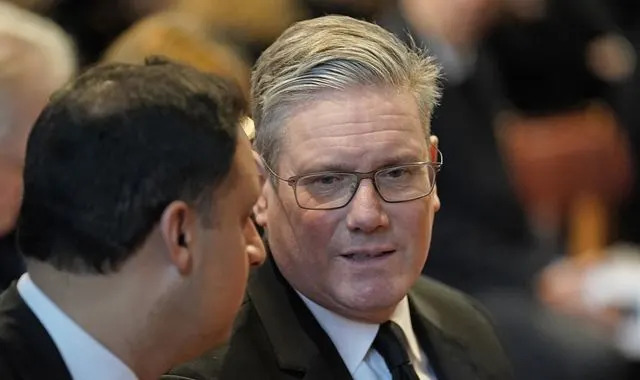
Sir Keir Starmer called for a "ceasefire that lasts" in Gaza - ahead of a vote in the Commons which risks re-opening Labour divisions on the issue.
The Labour leader, fresh from an appearance at a gathering of top politicians in Germany, said every conversation there had focused on what could be done to end the crisis in the Middle East.
"Not just for now, not just for a pause, but permanently. A ceasefire that lasts. That is what must happen now. The fighting must stop now," he said in a a speech to the Scottish Labour conference.
It comes a day after Scottish Labour unanimously backed a motion calling for an immediate end to the conflict.
However a Labour source suggested this was not what Sir Keir was endorsing and his comments are set within the context of any ceasefire being lasting and sustainable and coming from both sides, alongside the release of hostages.
Sir Keir's position on the war in the Middle East has caused a rift within Labour, as many MPs want him to explicitly back an immediate end to the fighting.
There are fears of a fresh row this week, when MPs will vote on a second SNP-led motion on an immediate ceasefire in Gaza.
In the previous vote in November, Sir Keir's decision to favour "humanitarian pauses" led to the departure of 10 shadow ministers and parliamentary aides who rebelled to back a full ceasefire.
But the party's position has hardened somewhat since then, with the Labour leader joining criticism of Israeli leader Benjamin Netanyahu's rejection of a two-state solution and talking about the need for a "sustainable ceasefire".
The Labour leadership has not confirmed how its MPs would be asked to vote on the SNP motion. Shadow foreign secretary David Lammy suggested on Sunday it would depend on the wording.
The party is under pressure given the position of Scottish Labour leader Anas Sarwar, who described the SNP motion as "perfectly reasonable".
Mr Sarwar himself is facing pressure to whip his two Scottish Labour MPs - Ian Murray and Michael Shanks - to vote for the SNP motion.
'Not much difference' between Scotland and UK Labour position
Earlier, he played down perceived differences between his position and that of Sir Keir.
He told Sunday Morning With Trevor Philips (SMTP) that Scottish Labour's motion was not calling for Israel to "unilaterally" stop their actions in Gaza but rather, "an to end violence both ways".
He said: "A ceasefire means the end of violence and rocket fire in Gaza, but also absolutely has to mean an end to rocket fire coming out of Gaza.
"It also includes the immediate release of hostages... alongside humanitarian aid needing to get in and the pathway to a two-state solution.
"In terms of where the position relates to the UK Labour Party and the Scottish Labour Party, I actually don't think there's much difference."
Mr Sarwar said rather than focus on the position of two opposition parties, next week's debate should focus on how to get parliament to find an agreement as a majority.
He said: "The Conservatives still have a majority in parliament.
"How do we get a majority that sends a unified message to Israel and in Palestine that we need the violence to stop right now? That should be our ambition rather than making this a debate about two opposition parties."
Mr Lammy also sought to play down the idea that the party was divided on the issue, telling the BBC's Sunday With Laura Kuenssberg: "I fully understand that Scottish colleagues want the fighting to stop now, we've been saying that for weeks, so we agree with them."
But he added: "I'm not sure that what's flying around on Twitter says anything about it being sustainable.
"You can have a ceasefire that lasts for a few days. We want the ceasefire to last and to be permanent and to move towards the diplomatic solution. It will only be a political solution that brings an end to this."
He declined to say how MPs might vote, saying: "I haven't seen the motion, it's not yet put down, we will scrutinise that motion as is our way in Parliament and we will take it from there."
SNP invites Starmer for meeting
The SNP has now written to Sir Keir offering a meeting to discuss the vote.
In a letter to the Labour leader published on Sunday, the SNP's Westminster leader Stephen Flynn said that death toll in the conflict has now risen to more than 29,000 and thousands more children have been killed. "It is long past time that the entire international community collectively said 'stop'."
Pointing to Mr Sarwar's comments he said: "In the absence of contact from any of your Labour Party colleagues, I am now writing to make clear that I am of course willing to have such a discussion. Given the importance of this issue - literally a discussion on life and death - the very least the public would expect is that the leaders of the SNP and the Labour Party at Westminster can sit down and have a discussion on this ceasefire motion.
"I am therefore proposing, and offering, that we meet tomorrow to discuss Wednesday's ceasefire motion. I will make sure my own diary is made flexible to ensure this meeting can take place as soon as possible."
Where do the UK's political parties stand on a Gaza ceasefire?
With Labour changing its stance and backing an immediate ceasefire, here's where the main UK parties stand on the Gaza conflict.
James Hockaday
Updated Sun, 18 February 2024
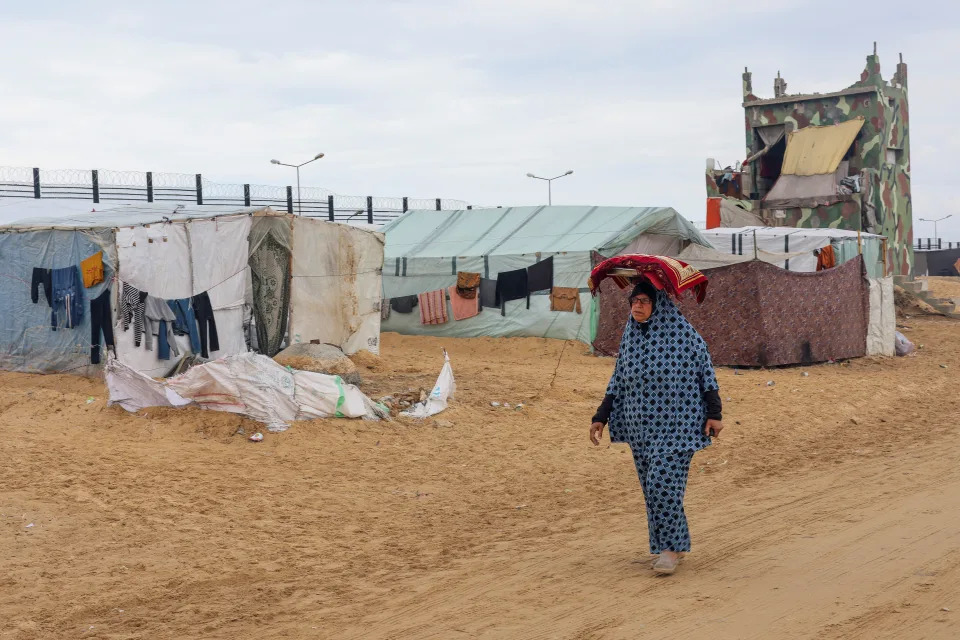
A displaced Palestinian woman, who fled her house due to Israeli strikes, walks past the border with Egypt in Rafah. (Reuters)
Labour leader Sir Keir Starmer has said fighting in the Middle East must "stop now" as he called for a “ceasefire that lasts” in Gaza.
He made the call while addressing Scottish Labour’s conference in Glasgow on Sunday, in an apparent strengthening of his stance on the Israel-Hamas conflict.
Starmer notably avoided his previously used term of “sustainable ceasefire”, which critics have suggested was too vague. He said he wanted to see a "return of all the hostages taken on October 7th, an end to the killing of innocent Palestinians, a huge scaling up of humanitarian relief and an end to the fighting".
It comes just days before a vote led by the Scottish National Party (SNP) on an immediate cessation of fighting this week, which Labour has so far not ruled out backing amid fears the Commons motion could reopen deep divides among MPs.
Here, Yahoo News explains what the UK's main political parties have said about the prospect of a Gaza ceasefire.
The Labour Party faced a crisis in November when nearly a third of its MPs defied Stamer by voting for an amendment, brought by the SNP, explicitly calling for an immediate ceasefire in Gaza.
Eight frontbenchers either resigned or were sacked after going against the party whip and backing the vote, including prominent Labour MP Jess Phillips.
In total 56 Labour MPs backed the SNP's position having been told to abstain from the vote. They were instead told to back Starmer's call for longer "humanitarian pauses" to allow the delivery of aid.
At the time, he stressed Israel's right to defend itself and said that supporting a ceasefire would be "inconsistent with saying it’s their right to try and get their hostages back".
In December, Starmer joined prime minister Rishi Sunak in calling for a "sustainable ceasefire" in Gaza, which would begin with a pause in fighting, the release of hostages, the distribution of aid and work towards setting up a two-state solution.
Some have suggested terms like this are ambiguous, with former State Department lawyer Brian Finucane telling POLITICO: “These are not terms of art with fixed, well-defined meanings, so the devil really is in the details.”
Now, with the death toll in Gaza nearing 29,000 people, according to Palestinian officials, and Scottish Labour unanimously backing a ceasefire motion on Saturday, Starmer has called for an immediate end to fighting.
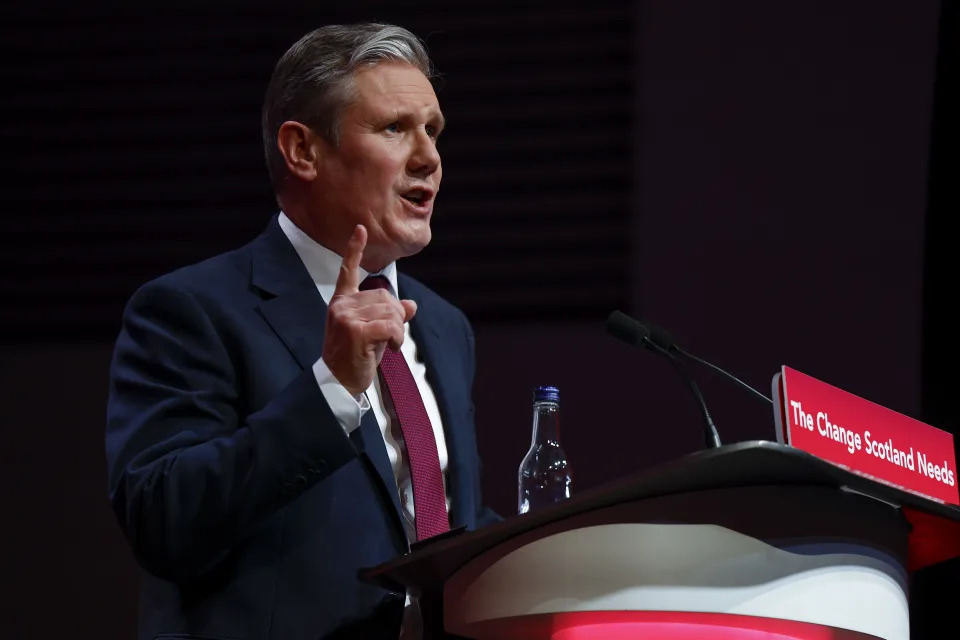
Labour leader Sir Keir Starmer has changed his position on a ceasefire as the death toll in Gaza mounts. (Getty Images)
Conservative Party
The Conservative government back a sustainable ceasefire, with foreign secretary David Cameron arguing in an article for the Sunday Times: "Only extremists like Hamas want us stuck in an endless cycle of violence, sacrificing more innocent lives for their fanatical ideology.
"But our goal cannot simply be an end to fighting today. It must be peace lasting for days, years, generations. We therefore support a ceasefire, but only if it is sustainable.
"We do not believe that calling right now for a general and immediate ceasefire, hoping it somehow becomes permanent, is the way forward. It ignores why Israel is forced to defend itself: Hamas barbarically attacked Israel and still fires rockets to kill Israeli citizens every day. Hamas must lay down its arms."
He added "leaving Hamas in power in Gaza would be a permanent roadblock on the path to a two-state solution". Cameron strikes a similar tone to US President Joe Biden, who has advocated a two-state solution under a revitalised Palestinian Authority, who partially govern the West Bank.
Some Tories have rebelled against the party line, including Paul Bristow, who was dismissed as a ministerial aide at the Department for Science, Innovation and Technology in October for publicly urging Rishi Sunak to back an immediate ceasefire.
Scottish National Party
Scotland's First Minister Humza Yousaf has urged Labour to back a ceasefire now with no caveats.
He added: "The SNP will bring forward another vote on an immediate ceasefire next week. Any political party that refuses to back it will be on the wrong side of history. I hope Keir Starmer does the right thing."
The SNP's motion warns that the 1.5 million Palestinians sheltering in the southern city of Rafah, including 610,000 children, have "nowhere else to go" – condemning "any military assault on what is now the largest refugee camp in the world".
It makes further calls for the immediate release of all hostages taken by Hamas and an "end to the collective punishment of the Palestinian people".
The SNP’s Westminster chief Stephen Flynn rejected a claim by Scottish Labour leader Anas Sarwar that Labour is in touch with his party’s whips about the wording of their Commons motion.
But he did offer to meet Starmer on Monday to discuss the vote, which is scheduled to take place on Wednesday.
Liberal Democrats
The Liberal Democrats are calling for an "immediate bilateral ceasefire in Israel and Gaza", adding that it has "always stood in support of a lasting peace and a two-state solution", says party leader Ed Davey.
However, the party adds that "Hamas cannot, for the security of Israelis nor the future of Palestinians, be allowed to continue in charge of Gaza".
Davey adds: "It is increasingly clear that a military solution to eliminate Hamas is not possible. Nor is it tenable for Israel to reoccupy Gaza. Only a sustained political and diplomatic solution will resolve this conflict and deliver a lasting peace. We urgently need movement towards that solution now. But how? The answer is via an immediate bilateral ceasefire.
"It is important to be clear. Some who call for a ceasefire really seem to mean freezing the conflict. But that’s not acceptable. It leaves Hamas in place in Gaza.
"Maximum pressure now needs to be applied on all parties, with tough conditions carefully monitored and verified. That will require a huge and sustained effort from the international community and the UN, with a particular role to be played by Arab neighbours."

Layla Moran, the UK's first MP of Palestinian heritage, has been vocal about her family's suffering in the Gaza Strip. (Alamy Live News)
Green Party
The Green Party called for an immediate ceasefire on 9 October, but this week the party called for a scaling up of sanctions against Israel and accused the UK government of "complicity" in killing.
In a statement on 12 February, it called for an "end to all arms sales to Israel, prosecutions of war criminals and targeted sanctions on Israel’s leaders".
Green Party co-leader Carla Denyer said: "It is clear that the Israeli government is refusing to heed warnings about the catastrophic implications of an all-out attack on Rafah. The UK government must now demand that Israel stop the killing, calling for an immediate ceasefire. Hamas must also agree to this ceasefire of course, and release all hostages.
“Decisions made by the UK government - above all its failure, month after month, to call for an immediate ceasefire - have made them complicit in the killing of almost 28,000 people to date, 12,000 of whom are children."
Denyer said the UK "must also cease all military collaboration with Israel, including allowing Israeli use of British bases and RAF intelligence flights over Gaza". She said the Green Party would also implement requirements of the controversial Boycott, Divestment and Sanctions (BDS) campaign across the UK economy.
Plaid Cymru
Plaid Cymru put forward a motion in the Senedd in November calling for an immediate ceasefire in the Gaza Strip.
Party leader Rhun ap Iorweth told members: “I feel the need to speak today as a member of humanity. We are human. The pain of loss is felt equally by an Israeli and a Palestinian mother. Today we speak up for peace for all mothers, fathers, brothers, sisters, sons and daughters.
“We speak today in pursuit of unity. We reject division. We take a stand against those seeking to encourage division. The motion today, condemning as it does the horrifying attacks, calling for the immediate release of hostages, notes clearly that Israel has a duty to ensure the protection, security and welfare of its citizens.
“But in the war that ensued after October 7, the response that ensued – inevitable as a response was going to be, so there has to be a duty to be proportionate; international law is clear on that. There can never be justification for the collective punishment of an entire population.”
